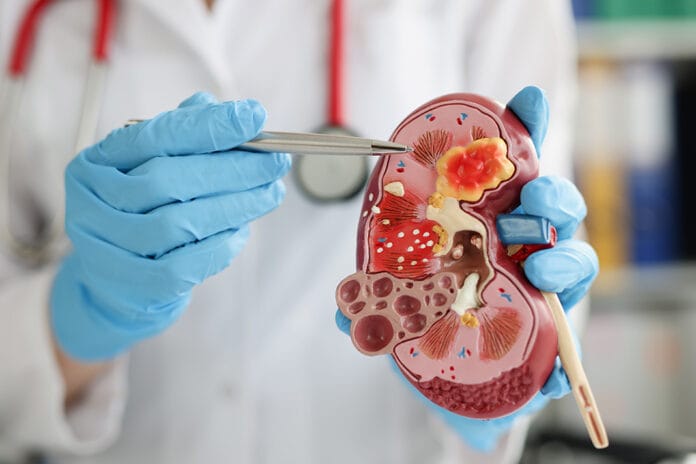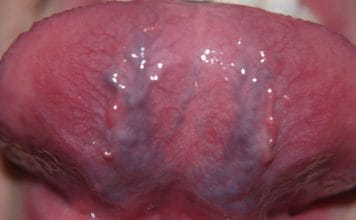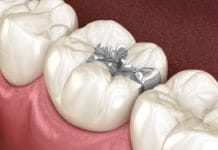I took a selfie after my kidney removal surgery. Hashtag no filter. Okay, okay, no more dad jokes, I promise. Our kidneys are hard workers and should not be made fun of. The two bean-shaped organs located just below our ribcage are incredible. They not only filter toxins and waste from the blood, but they also assist in making red blood cells, regulating blood pressure, maintaining adequate calcium for the health of bones, and supporting the immune system.
When disease compromises kidney health, those functions are altered and increase harmful systemic inflammation.1 It is important for dental providers to understand the give-and-take relationship between kidney dysfunction and dental diseases and how they adversely affect each other. Whether the weakened immunity, complications of infections, bone-related disorders, or xerostomia, we have the opportunity to become more involved in our patient’s wellness.
Chronic kidney disease (CKD) takes a long time to develop and usually has no signs or symptoms in the early stages. CKD has a multitude of causes, ranging from genetic disorders and heavy metal poisoning to infections. But diabetes is the biggest culprit. The kidneys are made up of millions of tiny filters called nephrons. Over time, high blood sugar from diabetes can damage blood vessels in the kidneys as well as the nephrons, so they don’t work as well as they should. Many people with diabetes also develop high blood pressure, which can damage the kidneys, too.
Infections
The CKD population is predisposed to unfavorable infectious events.2 Patients with CKD have an increased risk of infection because of the decreased immune response seen in the uremic atmosphere.3 CKD can contribute to systemic inflammation, and systemic inflammation can make chronic kidney disease worse ‒ a vicious cycle.
Like kidney disease, periodontal disease can contribute to systemic inflammation. Periodontal disease is a lingering bacterial infection that can become more aggressive and worsen faster with a compromised immune system. Evidence supports an association between periodontal disease and CKD.4,5
Xerostomia
Patients with CKD can be affected by other disorders such as diabetes, lupus, or Sjogren’s syndrome that may affect saliva flow. Patients taking hypertension medications like ACE inhibitors (angiotensin-converting enzyme) and calcium channel blockers have unpleasant side effects such as xerostomia.
Dental professionals are well-versed in substitutions and supplements to combat the downstream effects. Patients who have progressed to either dialysis treatment or a kidney transplant often complain of dry mouth.6
Bone Disorders
Eighty-four percent of CKD patients have bone disorders.7 CKD disrupts the process of modifying Vitamin D to a usable form in the body ‒ a dysregulation of sorts.8 Bone-related disorders such as osteoporosis and fracture propensity can be associated with CKD. CKD can also have a related systemic disorder known as CKD-mineral bone disorder, when calcium and phosphorus levels in the blood are out of balance. Providers may see bone demineralization, decreased trabeculation and thickness of cortical bone, jaw fracture, radiolucent giant cell lesions, and abnormal bone healing after extraction.
What does this mean for dental implants? Before implant placement, a consultation with the patient’s nephrologist is necessary for a review of cardiovascular history, diabetic, immune, and anemic status, as well as checking for abnormal hemostasis. If a patient is already on dialysis, the treatment is more intricate; blood tests should be considered, and a platelet transfusion may be recommended. The removal of any oral infections, caries and periodontal, should take place before implant placement. Antibiotic prophylaxis and minimally invasive implant procedures such as flapless implant surgery may be necessary.9
Dialysis and Kidney Transplants
Most dental procedures cause little to no bleeding, which is wonderful, but patients on hemodialysis require anticoagulants, which may alter a typical bleeding response. A consultation with the nephrologist is warranted for any adjustments, and remember to schedule dental visits on non-dialysis days.
Dialysis patients waiting for a kidney transplant require approval from dental providers due to the risk of infection. Some will need periodontal therapy before the transplant can happen. Patients with end-stage renal disease and periodontal disease have a strong association with cardiovascular mortality. Periodontal disease was associated with a five-fold increased risk of cardiovascular disease-related death in a retrospective study of hemodialysis patients.10
Elective dental procedures are not recommended after a transplant due to the doses of immunosuppressants taken for several months after surgery. One drug, cyclosporine, may cause gingival enlargement. Surgical intervention may be required in severe cases, although excellent oral hygiene may help contain the overgrowth. Check with the patient’s nephrologist about when to resume maintenance.
According to current estimates, one in seven or 15% of US adults has CKD.11 Of those with CKD, nine out of 10 don’t know they have it (roughly 33 million people). Early testing is vital for individuals with diabetes, high blood pressure, or other risk factors. A simple blood test that checks creatinine and a urine test to check for proteins. Dental providers can help CKD patients immensely through education, support, and proper treatment of the oral microbiome.
Before you leave, check out the Today’s RDH self-study CE courses. All courses are peer-reviewed and non-sponsored to focus solely on high-quality education. Click here now.
Listen to the Today’s RDH Dental Hygiene Podcast Below:
References
- Tucker, P.S., Scanlan, A.T, Dalbo, V.J. Chronic Kidney Disease Influences Multiple Systems: Describing the Relationship between Oxidative Stress, Inflammation, Kidney Damage, and Concomitant Disease. Oxid Med Cell Longev. 2015; 2015: 806358. https://www.ncbi.nlm.nih.gov/pmc/articles/PMC4377508
- Naqvi, S.B., Collins, A.J. Infectious Complications in Chronic Kidney Disease. Adv Chronic Kidney Dis. 2006; 13(3): 199-204. https://pubmed.ncbi.nlm.nih.gov/16815225/
- Johnson, D.W., Fleming, S.J. The Use of Vaccines in Renal Failure. Clin Pharmacokinet. 1992; 22(6): 434-446. https://pubmed.ncbi.nlm.nih.gov/1587056/
- Fisher, M.A., Taylor, G.W. A Prediction Model for Chronic Kidney Disease Includes Periodontal Disease. J Periodontol. 2009; 80(1): 16-23. https://pubmed.ncbi.nlm.nih.gov/19228085/
- Fisher, M.A., Taylor, G.W., Papapanou, P.N., et al. Clinical and Serologic Markers of Periodontal Infection and Chronic Kidney Disease. J Periodontol. 2008; 79(9): 1670-1678. https://pubmed.ncbi.nlm.nih.gov/18771368/
- Dirschnabel, A.J., Martins Ade, S., Dantas, S.A., et al. Clinical Oral Findings in Dialysis and Kidney-transplant Patients. Quintessence Int. 2011; 42(2): 127-133. https://pubmed.ncbi.nlm.nih.gov/21359247/
- Kidney Disease: Improving Global Outcomes (KDIGO) CKD-MBD Work Group. KDIGO Clinical Practice Guideline for the Diagnosis, Evaluation, Prevention, and Treatment of Chronic Kidney Disease – Mineral and Bone Disorder (CKD-MBD). Kidney Int Suppl. 2009; (113): S1-S130. https://pubmed.ncbi.nlm.nih.gov/19644521/
- Chau, Y.Y., Kumar, J. Vitamin D in Chronic Kidney Disease. Indian J Pediatr. 2012; 79(8): 1062-1068. https://pubmed.ncbi.nlm.nih.gov/22544696/
- Yuan, Q., Xiong, Q.C., Gupta, M., et al. Dental Implant Treatment for Renal Failure Patients on Dialysis: A Clinical Guideline. Int J Oral Sci. 2017; 9(3): 125-132. https://www.ncbi.nlm.nih.gov/pmc/articles/PMC5709544/
- Kshirsagar, A.V., Craig, R.G., Moss, K.L., et al. Periodontal Disease Adversely Affects the Survival of Patients with End-stage Renal Disease. Kidney Int. 2009; 75(7): 746-751. https://pubmed.ncbi.nlm.nih.gov/19165177/
- Chronic Kidney Disease in the United States, 2021. (2022, July 12). Centers for Disease Control and Prevention. https://www.cdc.gov/kidneydisease/publications-resources/ckd-national-facts.html















